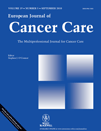Impact of quality of life parameters and coping strategies on postchemotherapy nausea and vomiting
Abstract
JORDAN K., GROTHEY A., PELZ T., LAUTENSCHLÄGER C., FRANKE U., SCHÖBER C. & SCHMOLL H.-J. (2010) European Journal of Cancer Care19, 603–609
Impact of quality of life parameters and coping strategies on postchemotherapy nausea and vomiting
To assess whether prechemotherapy quality of life (QoL) factors and certain coping strategies are associated with postchemotherapy nausea and vomiting (PCNV). A total of 43 chemotherapy-naïve patients scheduled to receive anti-emetic prophylaxis were enrolled in this study. QoL parameters were measured by a modified EORTC Quality of Life Questionnaire (QLQ-30). In addition, questions regarding active or passive coping strategies were asked 1 day before chemotherapy. Prechemotherapy QoL factors, coping strategies as well as other patient, disease and treatment variables were compared between the groups of patients with or without PCNV. The univariate analysis identified four QoL parameters, ‘tiredness’, ‘impairment of daily life by pain’, ‘sensation of abdominal pressure and fullness’ and ‘impairment of social activities’ as associated with PCNV. No association was found between coping strategies and PCNV. In the multivariate analysis, the factors ‘impairment of social activities’ and ‘sensation of abdominal pressure and fullness’ remained significant. Specific pretreatment QoL parameters are associated with the risk to develop PCNV. Thus, in addition to other established risk factors for PCNV, patients should be screened for these QoL factors in order to improve the control of PCNV and facilitate the selection of appropriate, individualised anti-emetic prophylaxes.




